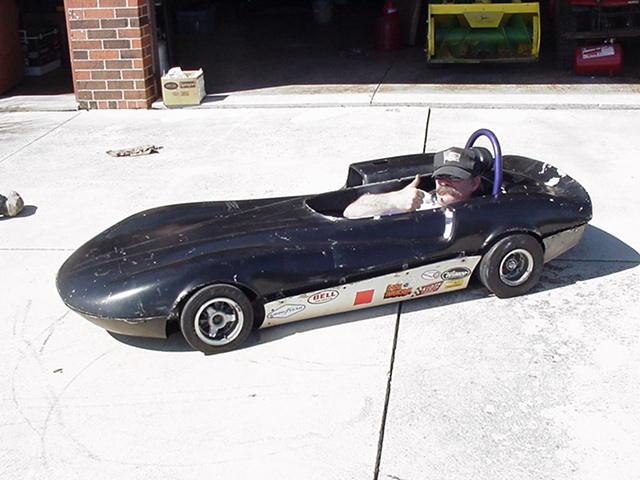There were quite a few South African designers/builders/drivers.
Louis Douglas Serrurier (9 December 1920 – 4 June 2006) was probably the most prolific constructor. He participated in the South African National Championship series, as well as in three Formula One World Championship South African Grands Prix in the 1960s, in his LDS single-seaters.Serrurier's best SAGP result was 11th in the 1963 event. There was a field of 20 cars, the GP being won by Jim Clark (Lotus), from Dan Gurney (Brabham) and Graham Hill (BRM).
A total of 9 LDS single-seaters were built to the 1.5-litre Formula 1 (1961-1965) regulations, and one 3-litre F1 car, which was entered by Team Gunston in the 1968 South African Grand Prix.
The LDS-Repco, along with team mate John Love's Brabham BT20, were the first F1 cars to be fully liveried in tobacco sponsorship in a World Championship Grand Prix. This opened the door for other tobacco companies to follow and Imperial Tobacco soon signed up Lotus, who raced as Gold Leaf Team Lotus from midway through the Tasman Series, with Gold Leaf liveried Lotus 49Ts, driven by Jim Clark and Graham Hill.
Tobacco companies became the mainstay of F1 sponsorship for more than three decades, until governments began to place a ban on cigarette advertising. In fact, only as recently as the 2010 Barcelona Grand Prix, due to pressure from the anti-tobacco lobbyists who accused Marlboro of subliminal advertising, Ferrari stopped using the ‘bar-code’ stripes on their cars.
 1967 LDS - Climax
1967 LDS - Climax 

 Tingle's LDS - Climax (back) leads the field off the grid in a South African championship race at Kyalami from JohnLove's Brabham BT20 (front).
Tingle's LDS - Climax (back) leads the field off the grid in a South African championship race at Kyalami from JohnLove's Brabham BT20 (front).  Sam Tingle's LDS - Repco 3-litre at the Rhodesian GP, December 1967.
Sam Tingle's LDS - Repco 3-litre at the Rhodesian GP, December 1967. Another was Gordon Murray, who was also a slot car builder and racer! He built and raced his own car full-size car, the IGM Ford, in South Africa during 1967 and 1968.
At the end of 1968 he went to England, looking for a job in motor racing. He was employed by Brabham as a draughtsman and in 1972 was appointed chief designer. The result was the Brabham BT42, which was driven by Carlos Reutemann and Wilson Fittiapldi in 1973. The design was further developed the following year into the Brabham BT44, in which Reutemann won three Grands Prix. Reutemann and Carlos Pace drove BT44Bs in 1975 and both drivers won a GP and scored other good results to move the team to second in the Constructors' World Championship.
Murray's most innovative design was the BT46B -- the Brabham 'fan' car. It featured a large fan at the rear of the engine, which sucked air from under the car through a radiator, providing cooling for the engine and at the same time creating downforce. In the hands of Niki Lauda the car won the Swedish GP, but was later banned by the FIA. The cars were modified again and with the fan removed, Lauda won the Italian GP. The team finished the year third in the Constructors' Championship.
As ground-effect technology developed, it became clear that a new engine was required because of the need for underbody aerodynamics at the rear of the car. Alfa Romeo designed a new V12 engine for Murray's next offering, the BT48. The car was not very successful, although Lauda won the non-championship Dino Ferrari Grand Prix at Imola. Murray then hurriedly designed a replacement - the BT49 - using Cosworth engines. The car appeared for the first time at the end of 1979 and was developed for the 1980 season, when Nelson Piquet became a frontrunner and won three GPs. In 1981 Piquet scored another three wins and consistent finishes resulted in winning the World Championship.
For 1982, Brabham had a deal to run BMW turbo engines and Murray designed the BT50, which won the Canadian GP. Murray's next design was the BT52, which enjoyed much success in the hands of Piquet and Riccardo Patrese, taking the Brazilian to the World Championship. This was developed into the BT53 for 1984 and while Piquet was still able to win with the car, it was unreliable. The development of the BMW engines continued with the BT54 in 1985, but the team's decision to use Pirelli tyres was not a good one, although Piquet had one GP victory.
Murray's last Brabham was the BT55, a another radical design which needed BMW to build engines which were tilted over to one side. This resulted in the car being very low and it soon became known as the 'skateboard' Brabham.
In the middle of the 1986 season Elio de Angelis was killed testing one of the cars and at the end of that year, Murray decided he had had enough of F1 and joined McLaren, where he was responsible for the McLaren F1 GTR sports car, although he headed the design team which produced the 1988 Honda-powered McLaren MP4/4, which won 15 of the 16 Grands Prix and gave Ayrton Senna his first Drivers' Championship. Murray continued to work for McLaren until early 2005, when he decided to pursue an independent career.
Kind regards,
Russell































